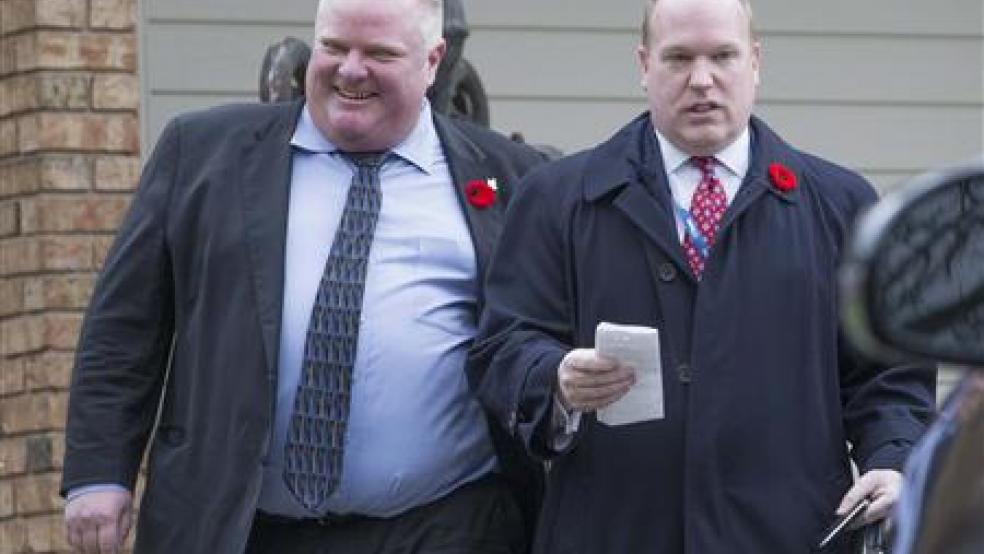TORONTO (Reuters) - Toronto Mayor Rob Ford admitted on Tuesday he has smoked crack cocaine, probably "in one of my drunken stupors," but insisted he's not an addict and said he would stay in office and run for reelection next year.
Speaking just days after Toronto's police chief confirmed that police have recovered a copy of a video that two media organizations have said shows the mayor smoking the drug, Ford said he had smoked crack about a year ago.
"Yes I have smoked crack cocaine... Probably in one of my drunken stupors, probably approximately about a year ago," he told reporters outside his office.
Later, he returned to address the media with an emotional formal statement. "To the residents of Toronto, I know I have let you down, and I can't do anything else but apologize," he said.
Elected in 2010 on a cost-cutting platform, Ford has been able to maintain strong voter support in his suburban base even as the scandal has escalated. A poll taken after Police Chief Bill Blair confirmed the existence of the video put Ford's approval rating at 44 percent, up five points from a previous poll.
But while Ford's popular support has held strong, his once rock-solid supporters at City Hall have started wavering.
City councilor Denzil Minnan-Wong, a member of Ford's cabinet-like executive committee, said he will bring a motion to the next city council meeting asking Ford to take a leave of absence. Council does not have the power to force Ford out of office.
"It is very disappointing to have the mayor of the City of Toronto admit to smoking crack cocaine," he told reporters. "I was disappointed at two levels: firstly that he did it, but secondly that it took him so long to admit it."
Another motion circulating at City Hall would seek to restrict Ford's ability to remove people from his executive committee and other standing committees.
Ontario Premier Kathleen Wynne voiced concern about the events in Toronto, but said the province would not intervene.
"I am not going to pre-empt what the mayor may or may not do," she told reporters. "I have said I'm concerned, the police service and the judicial system have to take action, but the mayor will have to make his decisions about what is appropriate right now... That's his responsibility."
'HAMMERED' AT FESTIVAL
Ford has already apologized for "mistakes" in his past, admitting to being "hammered" at a street festival this summer and drunk at City Hall after-hours on St. Patrick's Day last year. All four big Toronto newspapers, including the right-leaning Toronto Sun, have urged him to quit.
"I don't even remember," Ford said on Tuesday of his drug use. "After some of the stuff that you guys have seen me, the state I've been in. It's a problem."
In May, when the Toronto Star newspaper and the Gawker media blog first reported the existence of the video, Ford said he does not use crack cocaine, and that he could not comment on a video he has not seen.
Blair said on Thursday that police had obtained a video "consistent" with the Gawker and Star accounts, recovering the video from a deleted hard drive scooped up as part of a wide-ranging drug probe.
But that video did not in itself support laying charges against the mayor, Blair said.
Ford on Tuesday repeated a plea to the police to release the video, which he told the Toronto Sun was probably "not pretty".
Contacted after Ford's admission on Tuesday, a police spokeswoman said: "The information will be passed on to investigators."
Ford's predicament is reminiscent of former Washington D.C. mayor Marion Barry, who was infamously caught smoking crack-cocaine on a videotape in a Washington hotel during an FBI sting.
COUNCIL SUPPORT WANING
Ford's personal life made headlines even before he was elected mayor.
In 2006, when he was a member of city council, Ford caused what the Canadian Broadcasting Corp called "a drunken ruckus" during a Toronto Maple Leafs hockey game, shouting obscenities and insults until he was ejected.
In 2008, police charged him with assault and threats to his wife, but then withdrew the charges, citing inconsistencies in her story. Ford maintained his innocence, and the two later reconciled.
Despite the turmoil and despite his shrinking council support, Toronto's "weak mayor" system has meant that it's been mostly business as usual at City Hall.
Under the system, the mayor must secure council support for most measures. If council votes against his wishes, Ford has no power of veto.
(Reporting by Cameron French, additional reporting by Allison Martell and Susan Taylor; Editing by Janet Guttsman, Vicki Allen, Peter Galloway and Bernard Orr)


